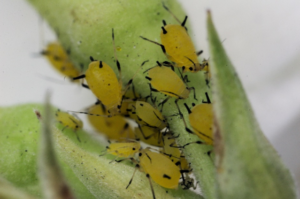
As most avid gardeners may have noticed, there are a lot of bugs out there this year. This is a result of the mild winter we experienced. It turns out warm weather is just as good for bugs as it is for people. The question now is what do we do to mitigate the damage these pests are doing to our landscapes?
Smart Yard takes a great deal of pride in knowing and practicing the safest and most effective methods of pest management. Integrated Pest Management, or IPM, is the core of our pest management practices. Integrated Pest Management is the process of evaluating the types of pests located on properties, knowing their lifecycles and how they interact with their environment and then choosing the method of control that will be the most effective and the least damaging to the environment. As stewards of our environment Smart Yard follows the steps below:
- IPM starts with knowing your landscape and the plants that are put into it. We advocate for planting the right plants in the right places. Making sure your landscape plants are well adapted to the area that they are planted in goes a long way to mitigating pest damage. Strong, healthy plants are less likely to become targets for hungry marauders.
- Proper cultural practices in the landscape can go a long way in reducing pest damage. Cleaning up your landscape and removing debris that attracts pests is another method of IPM. Smart Yard offers landscape clean ups any time of year and will make sure and remove any debris or weak plants that can harbor damaging pests.
Proper watering practices can also greatly reduce plant stress and make them better able to withstand attacks by pests and diseases. Smart Yard can help you program your irrigation clock according to your individual landscape’s needs.
Monitoring your lawn, trees and shrubs fertility will also help increase the health of your plants. Too much or too little fertilizer can make your plants susceptible to attack. Smart Yard can help you monitor your plants health and fertilize with just the right amount of nutrients when your plants need it.
- Monitoring your landscape, properly identifying pests and knowing what levels of pest damage is acceptable is an important part of IPM Practices. Most landscape plants can accept a small amount of pest damage. Knowing when to take action is key.
- Using mechanical and biological controls are forms of controlling pests that causes little environmental stress. Traps, hand picking, barriers and removing infested plants are forms of mechanical controls. Biological controls consist of using natural materials and processes to control pests. These can include bringing in pest predators or using biological insecticides such as BT which is a naturally occurring substance that targets worms.
- The last plan of attack would be using synthetic pesticides. These are used when other methods of pest control are ineffective. Smart Yard has licensed and trained technicians who know the proper use of these pesticides and can use them in the most effective, least harmful manner.
Call today to talk to a SmartYard Pro about implementing an Integrated Pest Management Plan for your property.
Your SmartYard Pros
801.739.7645

Pingback: para que sirve las tabletas cialis tadalafil de 5mg
Pingback: can you drink while on duloxetine
Pingback: long term effects of zoloft on the brain
Pingback: flagyl ciproxin
Pingback: how long does it take for cymbalta to get out of your system
Pingback: keflex allergy alternative
Pingback: lexapro dosage
Pingback: viagra generic price canada
Pingback: gabapentin johanniskraut
Pingback: can u get off on escitalopram
Pingback: fluoxetine symptoms
Pingback: cephalexin allergic reaction time
Pingback: how many drops of ciprofloxacin for ear infection
Pingback: is cephalexin a strong antibiotic?
Pingback: bactrim price
Pingback: can bactrim be used for tooth infection
Pingback: neurontin epilepsy
Pingback: is amoxicillin good for tooth infection
Pingback: diclofenac sodium topical gel over the counter
Pingback: cozaar blood pressure medicine
Pingback: how do you take contrave
Pingback: flomax partec download
Pingback: is augmentin a penicillin
Pingback: intranasal ddavp von willebrand
Pingback: horrible effexor withdrawals
Pingback: what is the difference between citalopram and escitaloprám
Pingback: ezetimibe mas fenofibrato
Pingback: depakote mechanism of action
Pingback: skelaxin vs flexeril
Pingback: diltiazem afib
Pingback: aripiprazole 10 mg tablet
Pingback: amitriptyline brand
Pingback: is aspirin acetaminophen
Pingback: allopurinol diarrhea
Pingback: best ashwagandha brand reddit
Pingback: how long after taking celebrex can i take ibuprofen
Pingback: does bupropion give you energy
Pingback: buspar for sleep
Pingback: actos espirituales
Pingback: remeron depression
Pingback: repaglinide long term side effects
Pingback: does robaxin have codeine in it
Pingback: another name for protonix
Pingback: how to lose weight on abilify
Pingback: acarbose source
Pingback: foods to avoid on semaglutide
Pingback: combination therapy with dutasteride and tamsulosin for the treatment of symptomatic enlarged prostate
Pingback: synthroid thirst
Pingback: ivermectin iv
Pingback: lupin sitagliptin
Pingback: max dose tizanidine
Pingback: what happens if you drink alcohol while taking venlafaxine
Pingback: side effects of spironolactone for acne
Pingback: voltaren gel (emulgel) 1% (50.00 grams)
Pingback: cialis online pills
Pingback: how long does levitra stay in your system
Pingback: does sildenafil make you last longer
Pingback: what is levitra
Pingback: sildenafil with alcohol reddit
Pingback: online tadalafil
Pingback: online pharmacy that sells phentermine
Pingback: pharmacy sell viagra in malaysia
Pingback: buy ivermectin pills
Pingback: what is tadalafil liquid
Pingback: what's the difference between sildenafil and tadalafil
Pingback: cost of ivermectin pill
Pingback: stromectol without prescription
Pingback: ivermectin 50mg/ml
Pingback: vardenafil canada pharmacy
Pingback: generic viagra for daily use
Pingback: vardenafil review
Pingback: buy generic sildenafil online
Pingback: cost of ivermectin 3mg tablets
Pingback: stromectol tablets 3 mg
Pingback: keflex safe in pregnancy
Pingback: glucophage lawsuits
Pingback: how long does doxycycline stay in your system
Pingback: how long does prednisone stay in your system
Pingback: amoxicillin dose for kids
Pingback: ciprofloxacin chlamydia
Pingback: ampicillin resistance gene sequence bla
Pingback: what pain reliever can i take with trazodone
Pingback: 600 mg gabapentin
Pingback: how long does discharge last after metronidazole
Pingback: how to get better sleep on tamoxifen
Pingback: cephalexin 500 mg dosage
Pingback: is pregabalin a narcotic
Pingback: valacyclovir and alcohol
Pingback: modafinil narcolepsy
Pingback: does lisinopril cause ed